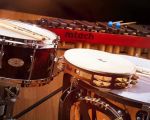- 1-Defining-the-Piano-as-a-Musical-Instrument
- 2-History-and-Evolution-of-the-Piano
- 3-How-the-Piano-Produces-Sound
- 4-The-Piano’s-Role-in-Different-Music-Genres
- 5-Famous-Pianists-and-Iconic-Piano-Compositions
- 6-Piano-Learning-Benefits-and-Why-It-Matters
- 7-Discover-Pianos-and-Accessories-at-Beat-Trigger
1. Defining the Piano as a Musical Instrument
The question “is piano a musical instrument?” is fundamental yet straightforward: yes, the piano is indeed a musical instrument. It belongs to the family of percussion and string instruments because it produces sound by hammers striking strings inside its body when keys are pressed. This unique mechanism allows it to combine melody, harmony, and rhythm, making it incredibly versatile.
The piano can play single notes or complex chords, enabling musicians to perform both accompaniment and solo pieces. Its range and expressive capabilities place it among the most important and widely used instruments worldwide.
2. History and Evolution of the Piano
The piano evolved from earlier keyboard instruments such as the harpsichord and clavichord during the early 18th century. Invented by Bartolomeo Cristofori around 1700, the piano revolutionized music with its dynamic control—allowing soft and loud playing by varying finger pressure on the keys.
Over centuries, the design and technology of the piano improved, leading to grand pianos, upright pianos, and digital keyboards, each adapting to different musical needs and spaces.
3. How the Piano Produces Sound
When a pianist presses a key, a small hammer strikes one or more metal strings tuned to a specific pitch inside the piano. The vibration of these strings is amplified by the soundboard, projecting rich and resonant sound.
This mechanism differentiates the piano from purely stringed instruments played with bows or plucked strings and percussion instruments that are struck externally. The piano’s unique construction allows nuanced control of tone and dynamics.
4. The Piano’s Role in Different Music Genres
The piano is a cornerstone in numerous musical styles—from classical and jazz to pop, rock, and even electronic music. In classical music, it serves as a solo instrument and in ensembles. Jazz pianists use it for improvisation and complex harmonies, while pop and rock artists integrate it for melodic and rhythmic foundation.
Its adaptability enables composers and performers to explore vast emotional and technical landscapes, making it indispensable in music creation and performance.
5. Famous Pianists and Iconic Piano Compositions
History celebrates pianists like Ludwig van Beethoven, Frédéric Chopin, and Sergei Rachmaninoff, whose virtuosic playing and compositions shaped the piano repertoire. In modern times, artists like Herbie Hancock, Elton John, and Alicia Keys have further expanded the instrument’s reach.
Iconic works such as Beethoven’s "Moonlight Sonata," Chopin’s nocturnes, and Gershwin’s "Rhapsody in Blue" showcase the piano’s emotional depth and technical brilliance.
6. Piano Learning Benefits and Why It Matters
Learning the piano offers cognitive, emotional, and social benefits. It improves coordination, memory, and discipline while fostering creativity and emotional expression. The instrument’s visual layout also helps beginners understand music theory more intuitively.
Whether pursuing professional mastery or casual enjoyment, playing the piano enriches lives and connects people across cultures.
7. Discover Pianos and Accessories at Beat Trigger
For those inspired to explore the piano, Beat Trigger offers a curated selection of pianos, keyboards, and accessories suited to all skill levels. From beginner models to professional instruments, find everything you need to start or enhance your musical journey.
Visit Beat Trigger for expert advice, high-quality products, and resources that empower your passion for music.








